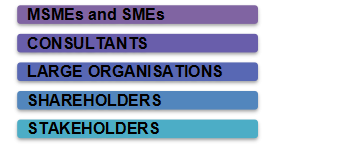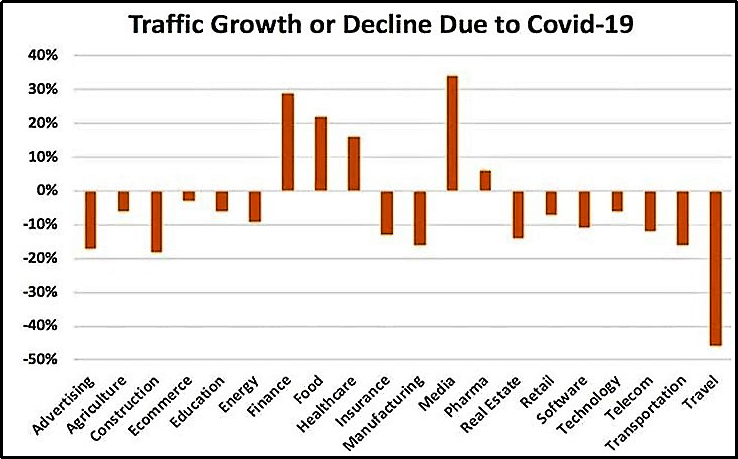Change the old formula to get new answers during COVID19 crisis: (2+2 will always = 4!)
Total Views |

In present times of economic downtimes owing to the COVID19, small and medium-sized enterprises (SMEs) and the Micro, Small and Medium Enterprises (MSMEs) are often the last to see in-flow of funds. With an already and over exerted cash flow in the market, a potential recession could spell serious suffocating crisis for an average organisation. Governments are now belatedly reacting following a failure to contain the COVID19 virus – closing borders, shutting down public gatherings, shuttering schools and offices, locking down cities, and pleading with people to stay home and practice “social distancing.” The massive restriction in movement, uncertainty, and ripples into the economy have rightfully terrified investors, sending markets into a complete spiral.
The reason why SMEs and MSMEs get worst hit is because of their size, they neither have budgets for such sudden exigencies nor a dedicated separate planning team who can foresee such contingencies. This is a matter for serious concern because of the integral role SMEs play in the larger economy. The role of the filler and binder that SMEs and MSMEs play in building the fortification of infrastructure of the economy is significant, as they continue to support businesses, enterprises and communities all over the globe. They are responsible for stimulating employment, productivity, and competitiveness in both emerging and developed markets. The growth of the SME and MSME sector in fact has become a marker for progress, development and economic strength in recent times.
The 5 broad segments that will comprise of this online community will be

It is like the food chain, where one faction feeds and helps sustain the one above it in the pyramid. And for this wheel of economy to keep moving on, it is imperative for all the spokes to be firm and in place. So what all can we do to keep the structure of our wheel intact?
Need for a new formula
Most of the business community, all sections and sectors included, even start-ups for that matter, including the Government had never foreseen anything like COVID19 pandemic before, and were hence completely unprepared for this kind of situation. We are rushing to dig up a well, when the house is already on fire…just like the famous subhashit (सुभाषित )
चिन्तनीया हि विपदां आदावेव प्रतिक्रिया।
न कूपखननं युक्तं प्रदीप्त वान्हिना गृहे॥
But now we have to use whatever we can to douse this fire and salvage the situation, to whatever best extent, we can. All we have known till date, is our old formulae by which we raced the circuit on the well –predictable and recognisable track. Every turn known, every gear planned, every tyre change organised. But now the track has changed entirely overnight, without a prior warning! No rules, no norms, no guidelines and no GPS. And we have to not just maneuverer, but reach the final check point, but go beyond. For this what we need is a new approach to crisis management, contingency planning and resource management.
The survival kit
A few pointers can handhold the MSMEs, SMEs and all such business faculty and organisations on this rough ride.
1. Prioritize people safety and continuous engagement
Adopt a more accommodating work culture. Especially since working from home has its own challenges. Do not forget dedicated and committed employees are using their resources and balancing work deliverables with house chores. Flexible work arrangements and remote working can actually get more work done! In case of team members having to work in the office premises, the Organisation can take responsibility of providing a safe working environment with the required precautions for their safety.
2. Reshape strategy for business continuity
Most businesses have started to see a tangible disruption in operations, deliverables and subsequent cash-flows during the COVID19 crisis. This includes disruption to supply chains, shifts in consumer demand, and particularly detrimental impact on sector on manufacturing, services, travel and hospitality.

- It would be a good idea for starters for Companies to instill short-term cash flow monitoring discipline and strict discipline on working capital. They should also maintain regular contact with suppliers to identify risks.
- Companies should also closely monitor direct cost escalations and the pressures impacting customers, and their outsourced vendors . Supply chain alternatives now require critical re-evaluation as regions remain under or enter lockdown.
- Finally, Organisations should stress-test plans for multiple scenarios for not just fiscal aspects but also for manpower and marketing results. Modify, amend and revise the plan to stay agile, and keep their heads above the water. They will need to look at near-term capital raising, debt refinancing, and policy supports from the government, while considering the curtailing of non-essential expenses.
3. Communicate with relevant stakeholders
Communicate! Communicate!! And communicate!!!
This is absolutely vital to secure on-going support from stakeholders during the COVID19 crisis. Organisations should keep customers apprised of impacts to product or service delivery, invoking “force majeure” clauses. When communicating with employees, firms have to find a balance between caution and a “business-as-usual” mind-set. Regular contact with vendors should also be maintained so as to obtaining suitable credit facilities and easing outflow burden. It will also help find time to connect with new alternative vendors, where supply chain options have been plugged at the moment.
4. Think out of the box
You have the set-up, the resources and the infrastructure. But cannot find ways to put it to use and generate business. Think out of the box. Find ways to push the envelope and do more and different things with the available means.
Automobile manufacturers like the SAIC-GM-Wuling, a General Motors venture in China, said it built 14 production lines with a daily capacity of 1.7 million masks and put out its first batch on Feb 9, 2020. Warren Buffett-backed BYD said it will start mass-producing the N95 masks before Feb 17 with capacity rising to five million - and 50,000 bottles of disinfectant liquid - a day by the end of the month.
5. Maximize the use of government support policies
Stay on the tip of your toes for updates and information, market trends and developments. Organisations should monitor Government and organizational opportunities for support, which may differ based on the working sector.
These may include tax exemptions, part waivers or facility of deferment of payment and banking moratoriums or interest reductions, that will evolve as the COVID19 crisis worsens.
6. Build resilience in preparation for a new normal
Once the MSMEs and SMEs evolve and adopt new strategies based on stress tests, they will have the planning sheet in place, to face this a fluid situation. If and when the outbreak is controlled, Companies will want to take stock of deficiencies – including timeliness of action, lack of suitable infrastructure, manpower shortages, and other issues. This should result in new internal guidelines and contingency plans to better respond to future critical situations.
This is the moment to contemplate, consolidate and also collaborate. It is also a time to try a different arithmetic suited for this different challenge. Remember, 2+2 will ALWAYS make 4. Organisations need to now change parameters to get new answers to challenge and survive this looming emergent calamity.

Trupti Nayak
COO- Media Vidya
trupti.nayak@mediavidya.com
trupti.nayak@mediavidya.com
Trupti Nayak has doctorate in Biotechnology and comes with more than 26 years of industrial work experience in a wide spectrum of industries ranging from meat exports, Dairy and Breweries to Cement and Steel in India and overseas. A Lead Project Management for over 8 years, she is certified ISO Quality Inspector and a consultant for marketing strategies of industrial technology and products. . She presently resides in Pune following her passion at Media Vidya.